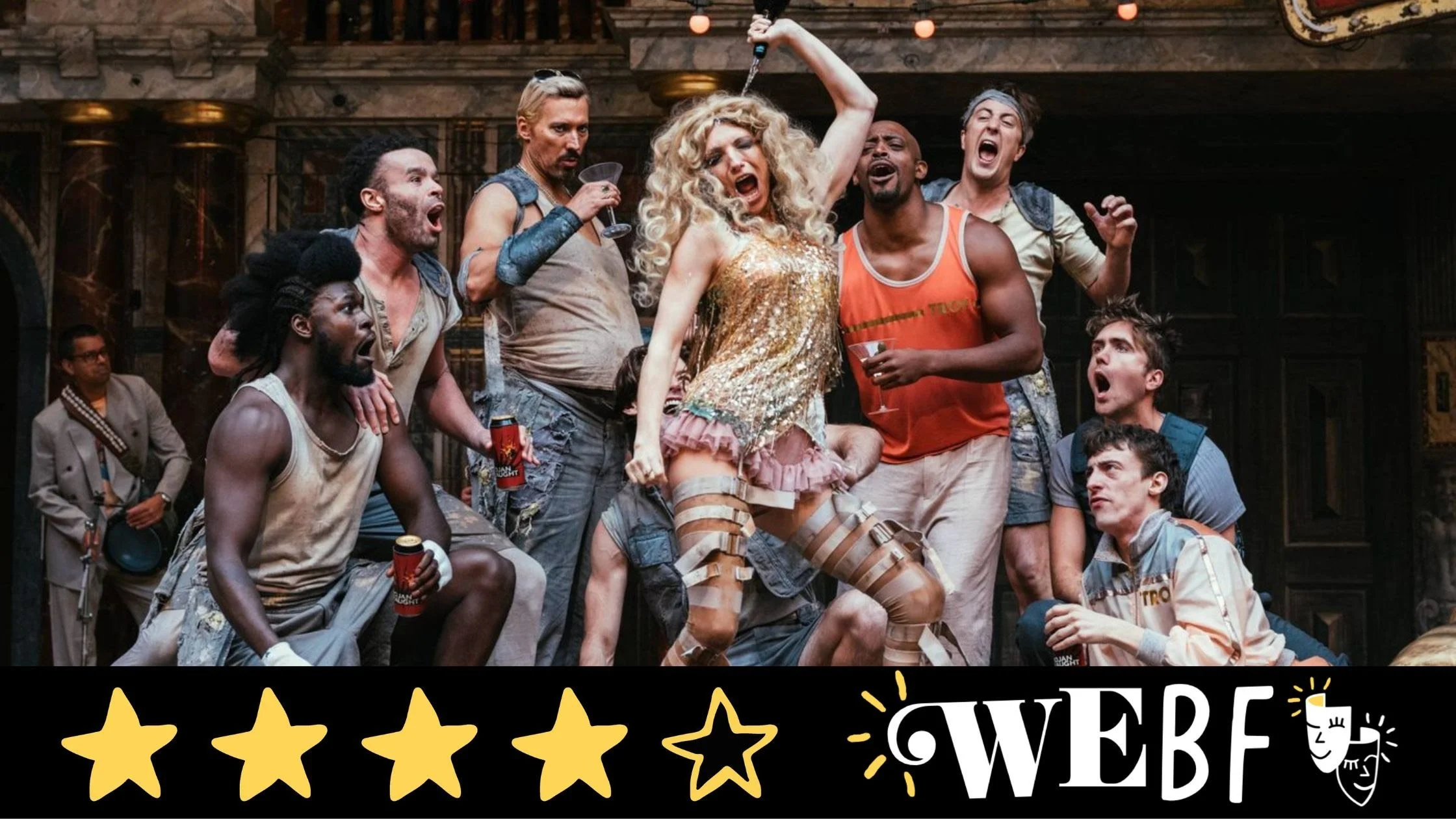Review: TROILUS AND CRESSIDA, Shakespeare’s Globe
Photo credit: Helen Murray
In his Globe directorial debut, Owen Horsley delivers a Troilus and Cressida that brims with wit, sharp satire, and surprising modernity. Often described as one of Shakespeare’s most unclassifiable works, neither comedy, tragedy, nor history, this so-called “problem play,” resembling in this instance a dark comedy, takes to the Globe’s stage and allows its contradictions to breathe. Horsley and team revel in the text’s mischievous ambiguity, drawing out its biting and bawdy humour and cynical reflections on hero worship, love, and the politics of power.
Set seven years into the Trojan War, Shakespeare’s version refuses to romanticise its epic source. The once-mighty heroes are now petty, tired, and vain. Soldiers and lovers trapped in endless cycles of pride and futility. Troilus and Cressida may open as a tale of young love between the earnest Trojan prince Troilus (played with naïve conviction by Kasper Hilton-Hille) and the bright yet pragmatic Cressida (Charlotte O’Leary), but the heart of the production lies in the crumbling myths around them. The gods are absent, and the so-called “heroes” of both camps are revealed to be all too human. The superstars of the Trojan War are all here: Hector, Achilles, Paris, Helen, Agamemnon… once titans of legend, now rendered as squabbling men, clinging to relevance. Heroism has cracked, and all that remains is ego, ambition, and the desperate performance of glory.
David Caves’ Achilles is self-absorbed, temperamental, and unexpectedly aloof, far from the godlike warrior of legend is counterbalanced by Jodie McNee’s calculating yet frustrated Ulysses. On the Trojan side, Oliver Alvin-Wilson’s Hector carries conviction.
Lucy McCormick is a scene-stealing force as a female Thersites, the play’s sharp-tongued cynic who spares no one finding a sadistic edge. Doubling as Helen, McCormick gleefully skewers the glamour that “launched a thousand ships” with a performance that parodies the modern-day diva in a way that is anarchic and ironic as a reminder that the absurdity of war and the cult of celebrity exist together. Samantha Spiro, doubling as Pandarus and the elderly Nestor, is magnetic; particularly her meddling Pandarus, now reimagined as Cressida’s overbearing aunt rather than uncle, radiates comic mischief. Spiro’s entrances are charged with presence and joy, her physical humour and command of the text in sync on the Globe’s stage.
Visually, the production is both subtly mythic and modern. Ryan Dawson Laight’s design conjures colours of cool blues and greys for the Greeks, citrus oranges and pinks for the Trojans with a kitsch edge, evoking something faintly disturbing. A fractured statue looms over the action, a relic of fallen greatness and a civilisation at war with its own reflection but overall, the set design is minimal, allowing the action to dominate the space.
On a rainy press night at the Globe, the cast handled the elements and fight choreography well with only the occasional slip and gasp from the audience. Daniel Hay-Gordon’s movement direction gives the production its heartbeat; the ensemble’s physical rhythm and clarity keep the story alive.
The production is lighter in tone than expected, peppered with dark twists but perhaps missing the full counterbalance of shade it might have drawn from the text. Still, it’s an engaging, entertaining ride.
If Troilus and Cressida itself resists easy categorisation, Horsley’s production embraces that instability. His vision is neither heroic nor romantic but a messy portrait of undone heroes.
**** Four stars
Reviewed by: Stephanie Osztreicher


